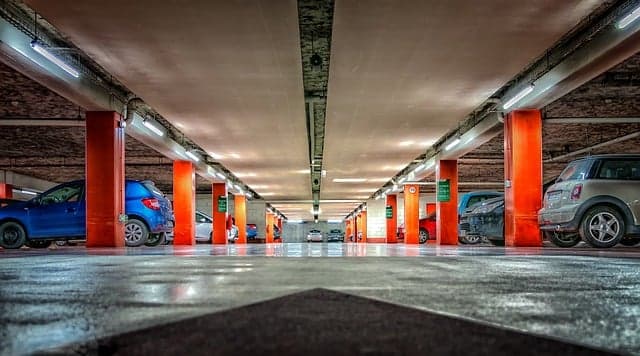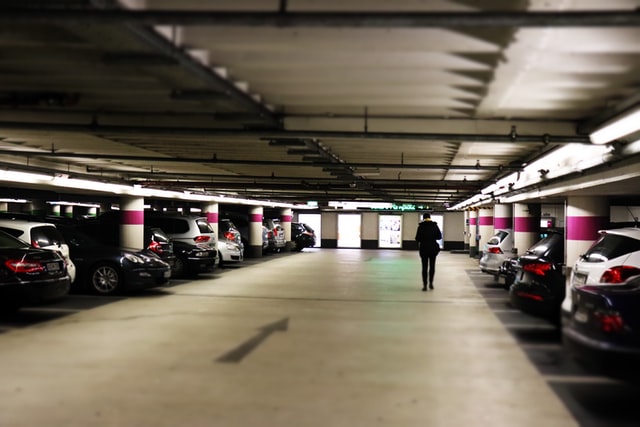Seven reasons why you should invest in parking spaces in Spain

It may not seem like much, but letting out parking spaces can be a lucrative business in Spain for people with few savings who want a quick and safe return on investment. Here’s why you should maybe consider a buy-to-let parking spot.
There will always be demand
As most people in Spain live and work in tightly-packed cities where parking spaces aren’t always readily available, having a spot to park can save drivers a lot of time and worry about their vehicles.
According to 2017 data by Spanish property giants Idealista, only 35 percent of homes in Spain have a garage or parking lot, but in 2019 there were 29.4 million cars in circulation in the country.
Even though there are plans to curb emissions and implement greener transport plans across the country, the compact design of urban areas in Spain means that demand for parking spaces is likely to be around for the foreseeable future.
The pandemic has increased demand further
There’s also been a rise in demand for parking places to rent since 2020 as people in Spain look to avoid enclosed spaces and a higher risk of infection on public transport.
This trend is likely to peak now that workers in Spain are slowly returning to their workplaces and will need somewhere to park their vehicles near their offices or homes after their daily commute.
Prices have dropped
A study by Spain’s other leading property search engine Fotocasa found that the average sale price of a parking place in Spain has gone from €13,762 in 2015 down to €9,817 in 2020.
Castilla y León (-37 percent) , Aragon (-36 percent), Navarra (-36 percent), Murcia (-33 percent), Valencia region (-33 percent), Asturias (-31 percent) and Andalusia (-28 percent) are the regions where the prices have dropped the most.
 Photo: Tim Smurf/Unsplash
Photo: Tim Smurf/Unsplash
Perfect for small investors
For people with few or moderate savings who want to diversify their earnings without spending more than they can afford, buying parking spaces in Spain can be a good option.
The smaller price tag also means that the likelihood of having to resort to financing is lower, meaning less interest to be paid.
The location of the parking space is the crucial factor that will determine how much the asking price is; depending on where it is it could go from costing €5,000 to €50,000.
Logically, there’s little point to investing in a spot in a sparsely populated town or village. Central and sought-after city locations are the sensible options.
The most expensive cities to buy a parking spot in Spain are San Sebastián (€25,734), Bilbao (€23,757) and Granada (€20,902), Ourense (€19,922), Santander (€18,962), Barcelona (€18,538), Jaén (€17,806), Madrid (€17,274) , Córdoba (€17,151), Pontevedra (€16,868) and Girona (€15,367).
Rental rates have risen
This greater demand has resulted in the average price at which parking spots are rented out in Spain increasing slightly.
Depending on the location, parking space rental rates can go from €50 to more than €300 euros per month
For example, in Barcelona they rose by 2.2 percent in 2020 compared to the previous year, and in Madrid it rose by 1.2 percent, according to Fotocasa.
Hassle-free and low maintenance costs
It may seem obvious but cleaning, repair and other maintenance costs are practically non-existent with parking spaces.
Lessors are less likely to run into problems with lessees renting their parking spaces than if they were letting out a property, both in terms of damage and non-payment.
Parking spaces are also not subject to meeting the stricter rules of Spain’s Property Law (Ley de Arrendamientos Urbanos) as in the case of residential properties.
However, investors do have to consider they’ll have to pay community expenses, real estate tax and perhaps some maintenance costs such as leaks in the ceiling.
Low risk
Leading Spanish property experts such as Colliers, Gesvalt and Merlin all agree that buying a parking place to rent out is one of the safest Covid-era investments around.
The reasons given for this include the steady rise in value of parking spots since the 2008 financial crisis, the increased usage of private vehicles during the pandemic and their comparatively lower price.
“The average parking space investor is very conservative, they settle for returns starting at 3.5 percent but that are very safe and they don't want problems with tenants,” Colliers General Director Alberto Díaz told El País.
“They’re always thinking of getting that extra money for their retirement.”
Good return on investment
You may not be able to get the high return on investment that residential properties can offer but parking spaces can see investors break even quickly depending on how much they’re charging to rent the spot per month.
“You can expect a gross yield of 7 percent to 7.5 percent depending on the location, parking space features and size of the parking space ,” according to Gregorio Martín-Montalvo, general manager of Solvia real estate company.
Are there any risks?
The main risk is not choosing the right location to buy the parking space, so a careful assessment (perhaps with the help of an expert) is the safest way to avoid possible letdowns.
Other less likely risks include a coronavirus financial crisis that’s as severe as 2008’s (which drove down demand and rental prices for parking spaces).
Furthermore, even though existing restrictions on urban parking in cities in Spain can result in many people opting to rent private parking in buildings, new green measures that may be introduced by the Spanish government to dissuade drivers from driving may have an impact on parking space demand.
An example of this are last-mile parking schemes, which can include large cost-free parking lots where commuters can leave their cars outside the city centre and use public transport as a means of tackling congestion.
READ ALSO:
Comments
See Also
There will always be demand
As most people in Spain live and work in tightly-packed cities where parking spaces aren’t always readily available, having a spot to park can save drivers a lot of time and worry about their vehicles.
According to 2017 data by Spanish property giants Idealista, only 35 percent of homes in Spain have a garage or parking lot, but in 2019 there were 29.4 million cars in circulation in the country.
Even though there are plans to curb emissions and implement greener transport plans across the country, the compact design of urban areas in Spain means that demand for parking spaces is likely to be around for the foreseeable future.
The pandemic has increased demand further
There’s also been a rise in demand for parking places to rent since 2020 as people in Spain look to avoid enclosed spaces and a higher risk of infection on public transport.
This trend is likely to peak now that workers in Spain are slowly returning to their workplaces and will need somewhere to park their vehicles near their offices or homes after their daily commute.
Prices have dropped
A study by Spain’s other leading property search engine Fotocasa found that the average sale price of a parking place in Spain has gone from €13,762 in 2015 down to €9,817 in 2020.
Castilla y León (-37 percent) , Aragon (-36 percent), Navarra (-36 percent), Murcia (-33 percent), Valencia region (-33 percent), Asturias (-31 percent) and Andalusia (-28 percent) are the regions where the prices have dropped the most.
 Photo: Tim Smurf/Unsplash
Photo: Tim Smurf/Unsplash
Perfect for small investors
For people with few or moderate savings who want to diversify their earnings without spending more than they can afford, buying parking spaces in Spain can be a good option.
The smaller price tag also means that the likelihood of having to resort to financing is lower, meaning less interest to be paid.
The location of the parking space is the crucial factor that will determine how much the asking price is; depending on where it is it could go from costing €5,000 to €50,000.
Logically, there’s little point to investing in a spot in a sparsely populated town or village. Central and sought-after city locations are the sensible options.
The most expensive cities to buy a parking spot in Spain are San Sebastián (€25,734), Bilbao (€23,757) and Granada (€20,902), Ourense (€19,922), Santander (€18,962), Barcelona (€18,538), Jaén (€17,806), Madrid (€17,274) , Córdoba (€17,151), Pontevedra (€16,868) and Girona (€15,367).
Rental rates have risen
This greater demand has resulted in the average price at which parking spots are rented out in Spain increasing slightly.
Depending on the location, parking space rental rates can go from €50 to more than €300 euros per month
For example, in Barcelona they rose by 2.2 percent in 2020 compared to the previous year, and in Madrid it rose by 1.2 percent, according to Fotocasa.
Hassle-free and low maintenance costs
It may seem obvious but cleaning, repair and other maintenance costs are practically non-existent with parking spaces.
Lessors are less likely to run into problems with lessees renting their parking spaces than if they were letting out a property, both in terms of damage and non-payment.
Parking spaces are also not subject to meeting the stricter rules of Spain’s Property Law (Ley de Arrendamientos Urbanos) as in the case of residential properties.
However, investors do have to consider they’ll have to pay community expenses, real estate tax and perhaps some maintenance costs such as leaks in the ceiling.
Low risk
Leading Spanish property experts such as Colliers, Gesvalt and Merlin all agree that buying a parking place to rent out is one of the safest Covid-era investments around.
The reasons given for this include the steady rise in value of parking spots since the 2008 financial crisis, the increased usage of private vehicles during the pandemic and their comparatively lower price.
“The average parking space investor is very conservative, they settle for returns starting at 3.5 percent but that are very safe and they don't want problems with tenants,” Colliers General Director Alberto Díaz told El País.
“They’re always thinking of getting that extra money for their retirement.”
Good return on investment
You may not be able to get the high return on investment that residential properties can offer but parking spaces can see investors break even quickly depending on how much they’re charging to rent the spot per month.
“You can expect a gross yield of 7 percent to 7.5 percent depending on the location, parking space features and size of the parking space ,” according to Gregorio Martín-Montalvo, general manager of Solvia real estate company.
Are there any risks?
The main risk is not choosing the right location to buy the parking space, so a careful assessment (perhaps with the help of an expert) is the safest way to avoid possible letdowns.
Other less likely risks include a coronavirus financial crisis that’s as severe as 2008’s (which drove down demand and rental prices for parking spaces).
Furthermore, even though existing restrictions on urban parking in cities in Spain can result in many people opting to rent private parking in buildings, new green measures that may be introduced by the Spanish government to dissuade drivers from driving may have an impact on parking space demand.
An example of this are last-mile parking schemes, which can include large cost-free parking lots where commuters can leave their cars outside the city centre and use public transport as a means of tackling congestion.
READ ALSO:
Join the conversation in our comments section below. Share your own views and experience and if you have a question or suggestion for our journalists then email us at [email protected].
Please keep comments civil, constructive and on topic – and make sure to read our terms of use before getting involved.
Please log in here to leave a comment.